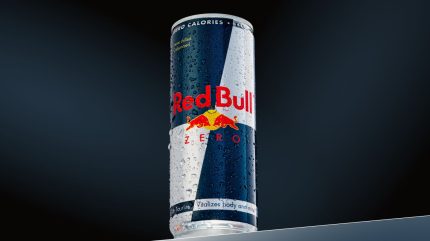
The European Commission has launched an anti-trust investigation into Red Bull to examine whether the energy drinks maker has “illegally restricted competition”.
In a statement yesterday (13 November), the Commission said it has “indications” Red Bull may have pursued a strategy to “restrict competition” from energy drinks sold in sizes above 250ml within the off-trade channel, such as supermarkets and petrol station shops.

Discover B2B Marketing That Performs
Combine business intelligence and editorial excellence to reach engaged professionals across 36 leading media platforms.
Austria-based Red Bull’s approach allegedly targeted products sold by its “closest competitor”, which was not named by the Commission.
Just Drinks approached Red Bull for comment. The company said it does not comment on “pending proceedings”.
Regulators are particularly focused on the Netherlands, where Red Bull appears to hold a “dominant position” in the national market for the wholesale supply of branded energy drinks.
The inquiry will investigate whether the company implemented two practices that could restrict rivals. The Commission said it is looking into whether Red Bull offered monetary and non-monetary incentives to off-trade customers to delist or reduce the visibility of competing energy drinks larger than 250ml.

US Tariffs are shifting - will you react or anticipate?
Don’t let policy changes catch you off guard. Stay proactive with real-time data and expert analysis.
By GlobalDataBrussels is also studying whether the privately owned giant exploiting its role as category manager at some retailers to ensure products were delisted or disadvantaged.
Under category management agreements, retailers delegate the management of a product segment to a designated supplier, or “category manager”, which can influence the assortment, placement and promotion of both its own and competitors’ products.
The Commission said the investigation was the first into a potential abuse tied to the misuse of a category management role by a supplier.
If established, the conduct under scrutiny could infringe EU rules prohibiting the abuse of a dominant position.
The Commission said it will conduct the investigation “as a matter of priority”, adding the opening of proceedings does not prejudge the outcome.
Teresa Ribera, executive vice-president for clean, just and competitive transition at the Commission, said: “We are opening an investigation into Red Bull’s alleged plan to protect its well-known energy drink from rival products, in breach of competition rules. We want to see if these practices may be keeping prices high and limiting choice of energy drinks for consumers.”
The investigation comes after EU officials launched “unannounced inspections” at Red Bull’s headquarters and several EEA units in March 2023, followed by probe at the group’s premises in Brussels in June 2023, as well as between August and September 2023.
Red Bull challenged the inspection decision before the general court and sought to suspend the continued inspection in Brussels.
In September 2023, the president of the general court dismissed the suspension request.
Last month, the general court rejected Red Bull’s challenge to the inspection decision, finding that “decision was well founded, that it was adopted on the basis of sufficient indicia, and that it was neither arbitrary nor disproportionate”.
There is no fixed deadline for concluding anti-trust cases.
The length of proceedings depends on factors such as the complexity of a case and the level of cooperation by the companies involved.





